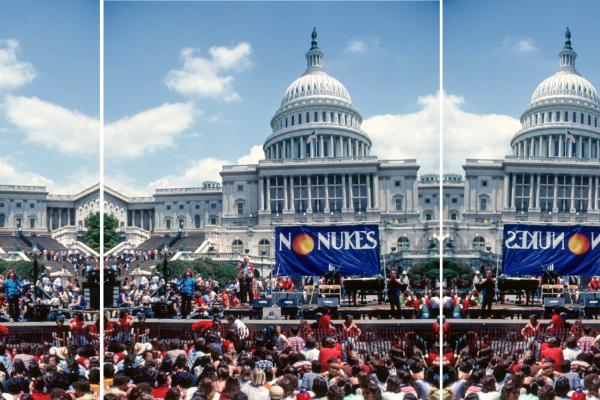THE ARREST OF SEVEN Catholic activists from the Plowshares movement who entered a nuclear submarine base in April again highlights the enduring threats posed by nuclear weapons. The Kings Bay Plowshares carried religious banners promoting peace onto the naval base in Georgia that houses Trident submarines armed with missiles with nuclear warheads. “This weapons system is a cocked gun being held to the head of the planet,” the activists said in a statement as they were arrested.
At a time when President Trump reportedly told Russian President Vladimir Putin that the U.S. would win a nuclear arms race between the two countries, nuclear disarmament efforts feel tenuous. Former U.S. Secretary of Energy Ernest Moniz, who helped broker the Iran nuclear agreement, has warned that the chance of a nuclear launch is “higher than it’s been since the Cuban missile crisis.”
Against this backdrop, the clock is ticking on the New Strategic Arms Reduction Treaty signed in 2010 by President Obama and Russia’s then-President Dmitry Medvedev that limits strategic warheads and delivery systems in the two countries. Unless action is taken to extend that agreement, it will expire in 2021. If that happens, for the first time in more than 40 years the U.S. and Russian nuclear arsenals would operate free of an arms control agreement.
The Pentagon released a nuclear arms policy in February that requests two new types of nuclear weapons, essentially ending the Obama administration’s efforts to reduce the U.S. nuclear arsenal. Defense Secretary Jim Mattis described the changes as a need to “look reality in the eye” and to “see the world as it is, not as we wish it to be.”
Forgive me for my eye roll, but I will look to someone else for a clear moral vision.
Pope Francis offers a saner path, and one that you don’t have to be religious to affirm. The pope told a Vatican conference on disarmament last fall that nuclear weapons exist “in the service of a mentality of fear that affects not only the parties in conflict but the entire human race.” The pope condemned not only “the threat of their use” but also “their very possession.” While previous popes spoke out against nuclear arms, Pope Francis is the first to specifically condemn the possession of nuclear weapons. He has made the cause a leading diplomatic priority of his papacy.
Envisioning our world nuclear-free requires confronting what Pope Francis describes as the blood money of the global weapons trade. More than 50 years ago, Dwight Eisenhower warned of a “military-industrial complex” and highlighted the self-sustaining relationship between the government and corporations whose financial bottom lines benefited from a perpetual state of war preparations.
The problem is much worse today. A recent report finds that more than 300 financial institutions invested more than $525 billion into the top 20 companies involved in the production and modernization of nuclear weapons over the past several years. The top 10 financial institutions with the biggest investments in making nuclear weapons—including Goldman Sachs, Wells Fargo, and Citigroup—are all U.S. firms.
Debates over nuclear weapons and ballooning military budgets should never be framed as a contest between clear-eyed pragmatists and naive idealists. The world is a dangerous place. People of faith work in conflict zones every day. Along with moral clarity, religious leaders and institutions bring on-the-ground experience.
We can look reality in the eye, as Mattis put it, and also believe another world is possible. The history of social change is the story of faithful dissenters and dogged activists being told that things are inevitable, and then having the moral imagination to prove conventional wisdom wrong.
The nuclear status quo is a nightmare waiting to happen, as the Catholics arrested in Georgia make clear. Let’s dream of something saner and secure. And then organize to make that vision real.

Got something to say about what you're reading? We value your feedback!

